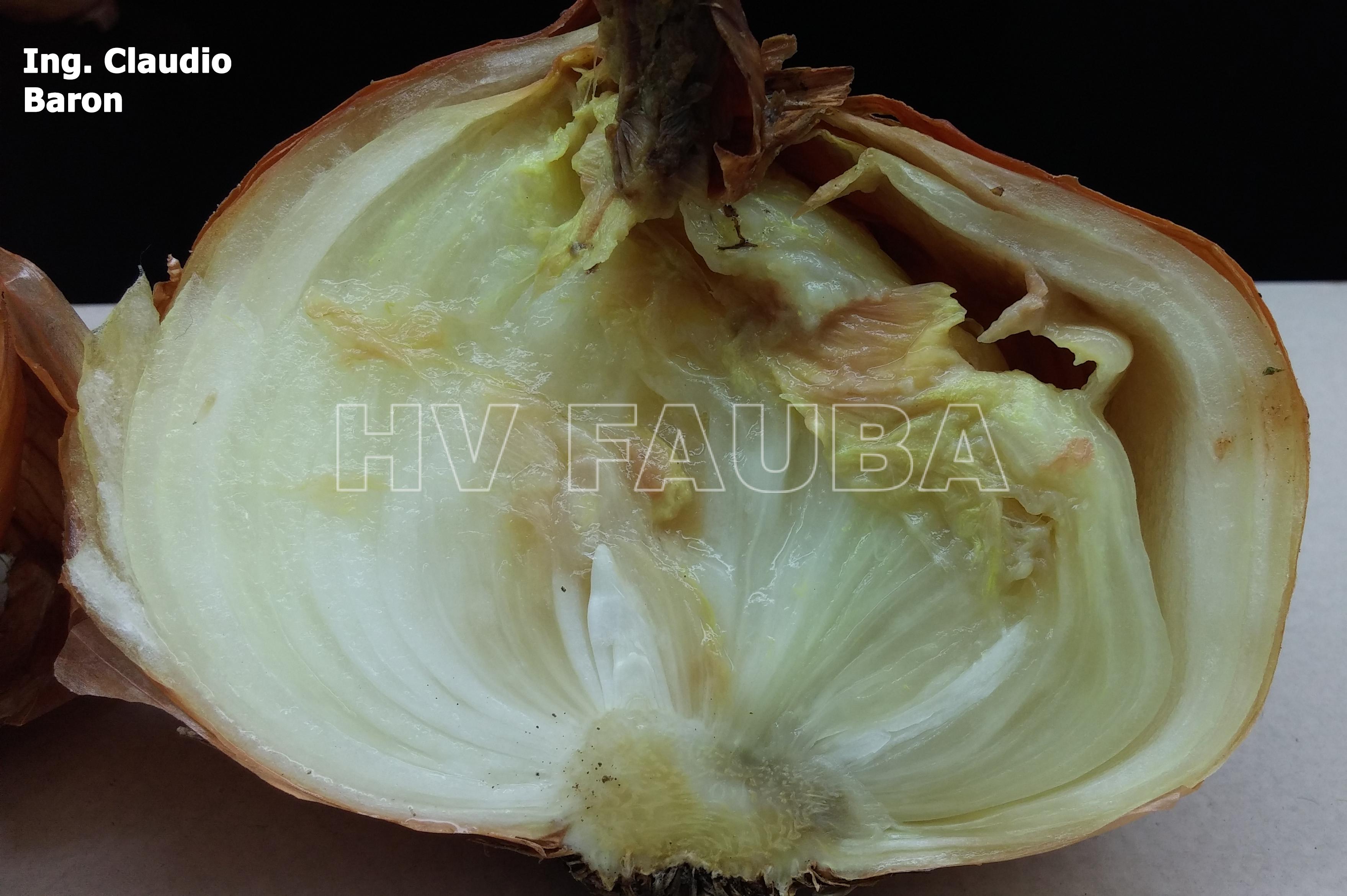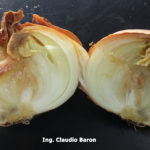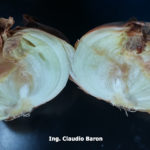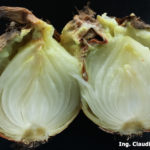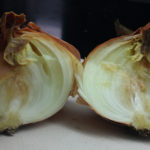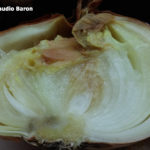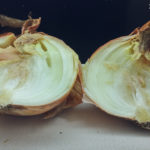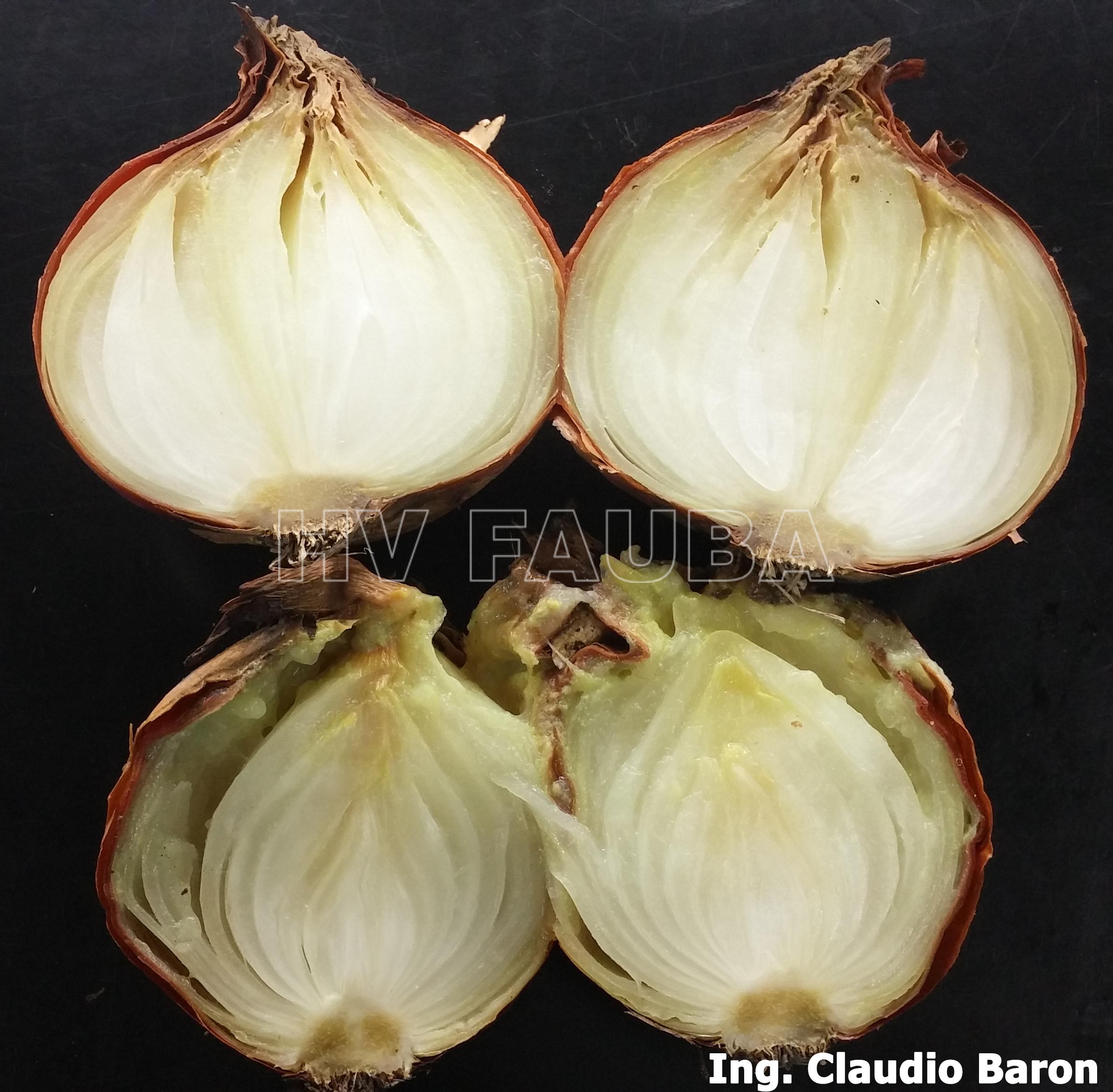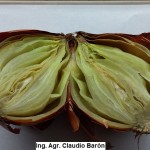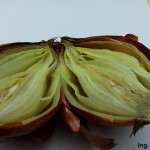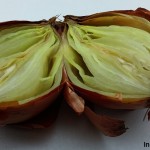.
Condición fitosanitaria: Presente
Grupo de cultivos: Hortícolas
Especie hospedante: Cebolla (Allium cepa)
Etiología: Bacteria. Gram negativa
Agente causal: Pectobacterium carotovorum subsp. carotovorum (Jones, 1901) Waldee, 1945
Taxonomía: Bacteria > Proteobacteria > Gammaproteobacteria > Enterobacteriales > Enterobacteriaceae > Pectobacterium > Pectobacterium carotovorum
.
.
Síntomas
Las catáfilas externas se observan arrugadas y hundidas, los tejidos reblandecidos y se percibe un olor fetido. Cualquier herida producida en el bulbo, o el curado inadecuado del cuello y las catáfilas exteriores, resultan una vía de entrada para la bacteria. Bajo condiciones elevadas de humedad y temperatura (25 – 30ºC) se intensifica la agresividad del patogeno.
.
- Autor: Ing. Claudio Baron
- Autor: Ing. Claudio Baron
- Autor: Ing. Claudio Baron
- Autor: Ing. Claudio Baron
- Autor: Ing. Claudio Baron
- Autor: Ing. Claudio Baron
- Autor: Ing. Claudio Baron
.
.
Manejo de la enfermedad
Erradicar plantas enfermas, evitar las heridas al momento de la cosecha o durante las labores culturales, realizar la recoleccion de la cebolla con la menor humedad posible, propiciar un curado adecuado para que el bulbo se selle.
.
- Autor: Ing. Claudio Baron
.
.
.
Bibliografía
Haque MM, Oliver MMH, Nahar K, Alam MZ, Hirata H and Tsuyumu S (2017) CytR Homolog of Pectobacterium carotovorum subsp. carotovorum Controls Air-Liquid Biofilm Formation by Regulating Multiple Genes Involved in Cellulose Production, c-di-GMP Signaling, Motility, and Type III Secretion System in Response to Nutritional and Environmental Signals. Front. Microbiol. 8:972. doi: 10.3389/fmicb.2017.00972
Li X, Fu L, Chen C, et al. (2020) Characteristics and Rapid Diagnosis of Pectobacterium carotovorum ssp. Associated With Bacterial Soft Rot of Vegetables in China. Plant Dis. 104(4): 1158-1166. doi: 10.1094/PDIS-05-19-1033-RE
Lu Q, Yan F, Liu Y, Li Q, Yang M, Liu P (2021) Comparative Genomic Analyses Reveal Functional Insights Into Key Determinants of the Pathogenesis of Pectobacterium actinidiae in Kiwifruit. Phytopathology. doi: 10.1094/PHYTO-07-20-0287-R
Ma B, Hibbing ME, Kim HS, et al. (2007) Host range and molecular phylogenies of the soft rot enterobacterial genera Pectobacterium and Dickeya. Phytopathology. 97(9): 1150–1163. doi: 10.1094/PHYTO-97-9-1150
Palacio‐Bielsa A, Cambra MA, López MM (2007) First report of bacterial soft rot on onion caused by Dickeya sp. (ex Pectobacterium chrysanthemi) in Spain. Plant Pathology 56: 722-722. doi: 10.1111/j.1365-3059.2007.01589.x
, (2023) Field surveys indicate taxonomically diverse Pectobacterium species inducing soft rot of vegetables and annual crops in Iran. Plant Pathology 00: 1– 12. doi: 10.1111/ppa.13735
Tovar-Herrera OE, Rodríguez M, Olarte-Lozano M, et al. (2018) Analysis of the Binding of Expansin Exl1, from Pectobacterium carotovorum, to Plant Xylem and Comparison to EXLX1 from Bacillus subtilis. ACS Omega3(6): 7008–7018. doi: 10.1021/acsomega.8b00406
, , , et al. (2020) Pectobacterium atrosepticum KDPG aldolase, Eda, participates in the Entner–Doudoroff pathway and independently inhibits expression of virulence determinants. Molecular Plant Pathology 22: 271– 283. https://doi.org/10.1111/mpp.13025
